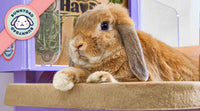Not everything about our pets is simple, and not everything is cute. Coprophagy in rabbits is completely natural, and a necessary and healthy practice, by which a rabbit eats a specific type of excrement, called cecotropes, directly from its anus.
For a comprehensive guide on rabbit poop and ways to monitor your bunny's health by looking at their poop, check out our Rabbit Poop Chart.
Rabbit poop, in general, while not as offensive to the senses as the feces of many other mammals, is not what we’d call cute. Rabbit cecotropes do differ from normal rabbit droppings, however, in that these specific rabbit feces are mostly odorless, and have many probiotics that aid in your rabbit’s digestion.
What Does Rabbit Poop Look Like?

While normal rabbit feces comes in the form of small brown poop pellets, Cecotropes resemble shiny brown clusters of grapes, and cling to the anus, allowing rabbits to eat them straight from their bodies.
Cecotropes, also referred to as caecotrophs, caecal pellets, "night feces" or "soft feces," are a type of specialized feces produced by rabbits, guinea pigs, and some other small mammals, that play a role in maintaining healthy gut bacteria, and properly absorbing all the nutrients from their fiber-rich diets.
Cecotropes are different from the typical hard, round pellets that rabbits produce as their regular feces. They are soft, greenish or brownish, and have a mucus-like texture. are the product of the cecum, a part of the digestive system in mammals

Nutrients and Benefits of Rabbit Cecotropes
Cecotropes play a crucial role in a rabbit's digestive and nutritional health, and they are important for several reasons:
- Cecotropes contribute to this microbial balance and support the rabbit's ability to digest a high-fiber diet.
- Protein Intake: Rabbits are herbivores and have a limited ability to digest proteins in their stomach. By consuming cecotropes, rabbits can obtain essential amino acids and proteins that are crucial for their overall health and growth.
- B Vitamins: Cecotropes are also rich in B vitamins, which are essential for
- Nutrient Recycling: Cecotropes are rich in essential nutrients, particularly vitamins, minerals, and proteins. They contain nutrients that were not fully absorbed during the initial passage through the rabbit's digestive system. By consuming cecotropes directly from their anus (a process known as cecotrophy or coprophagy), rabbits can re-ingest these valuable nutrients, allowing for more efficient absorption and utilization.
- Microbial Balance: Cecotropes help maintain a healthy balance of microorganisms in a rabbit's cecum, which is a specialized part of their digestive system where fermentation of fibrous plant material occurs. The microorganisms in the cecum help break down complex carbohydrates and cellulose in tvarious metabolic processes in rabbits. These vitamins are produced by the cecal microorganisms and are made available to the rabbit when they ingest their cecotropes.
- Fecal Pellet Formation: After consuming cecotropes, rabbits will re-digest and process the nutrients. The indigestible parts are then excreted as the familiar hard, round fecal pellets that are often seen in their litter boxes.

Does My Rabbit Have to Eat Its Own Poop?
When a rabbit is unable to eat its cecotropes, it can have detrimental effects on its health. Cecotropes are a vital source of essential nutrients, including vitamins, minerals, proteins, and B vitamins.
If a rabbit cannot consume these nutrient-rich pellets due to digestive issues, dental problems, obesity, or other underlying health conditions, it can lead to malnutrition and a host of related health problems.
Without the important nutrients found in cecotropes, rabbits may suffer from deficiencies that can result in lethargy, poor coat quality, weakness, and compromised immune function.
Additionally, the imbalance in their gut microbiome can disrupt digestion, causing gastrointestinal discomfort and potentially leading to more severe digestive disorders.
Therefore, it's crucial for rabbit owners to monitor their pets closely, address any issues that prevent cecotrope consumption, and seek veterinary care to ensure their rabbits receive the necessary nutrients for optimal health.
Wire-Bottom Cages
While wire-bottom cages are never advisable for rabbits, as they can seriously hurt their sensitive feet and hocks, there is no needed concern about rabbits being unable to retrieve their cecotropes to eat them.
Similarly, you don’t need to be concerned about cleaning up too regularly after your rabbit in this regard. Rabbits eat their cecotropes directly from their anus, often as part of their own grooming routines, so there should be no need to retrieve fallen or discarded excrement.

How Often Do Rabbits Eat Poop?
The frequency at which a healthy pet rabbit should consume cecotropes varies from one individual to another. However, there are some general guidelines to keep in mind:
- Regular Occurrence: Cecotropes should be produced and consumed regularly by a healthy rabbit. Typically, rabbits will produce cecotropes in the early morning or late at night.
- Monitoring Behavior: Pay close attention to your rabbit's behavior and habits. A healthy rabbit will often consume cecotropes directly from their anus. If you observe your rabbit doing this, it's a positive sign that their digestive system is functioning correctly.
-
Diet Considerations: Ensure that your rabbit's diet is well-balanced and high in fiber. A diet rich in hay, fresh vegetables, and a limited amount of pellets can promote healthy cecotrope production.
-
Individual Variations: Some rabbits may produce more cecotropes than others, and the frequency of consumption can vary. It's essential to understand your rabbit's specific habits and adjust their diet accordingly.
- Veterinary Guidance: If you notice a change in your rabbit's cecotrope production or consumption, consult with a veterinarian who specializes in rabbit care. Changes in cecotrope production could be indicative of underlying health issues.

Cecotropes are a fundamental aspect of a rabbit's digestive and nutritional system. The frequency at which a healthy pet rabbit should consume cecotropes can vary, but regular production and consumption are signs of a well-functioning digestive system.
As a responsible rabbit owner, it's crucial to understand the significance of cecotropes and provide your furry companion with a balanced diet and proper care to ensure their overall well-being. If you have any concerns about your rabbit's cecotrope production or diet, don't hesitate to seek guidance from a veterinarian experienced in rabbit care.
By consuming these specialized feces, rabbits can maximize the nutritional value of their diet, maintain a healthy gut microbiome, and ensure they receive essential nutrients critical for their overall well-being.
It's essential for rabbit owners to understand the significance of cecotropes and ensure their rabbits have access to them as part of their natural diet. If a rabbit is unable to produce or consume cecotropes, it may indicate an underlying health issue that requires veterinary attention.
Remember to check out our Rabbit Poop Chart to learn how to tell if your rabbit is healthy by looking at their poop.
Happy snacking, BunnyGang! <-Just kidding (sort of).
See you soon,
~ BunnyDad








